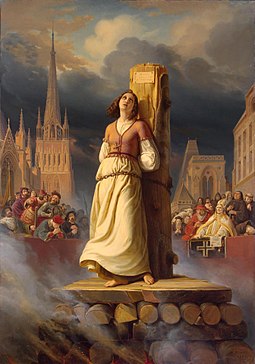It happened today - April 29, 2016
 Generally I try not to be rude to Joan of Arc. I know the French like her a lot. But April 29 was the beginning of the end for her, back in 1429, and I consider it very revealing.
Generally I try not to be rude to Joan of Arc. I know the French like her a lot. But April 29 was the beginning of the end for her, back in 1429, and I consider it very revealing.
As you presumably know, she had visions. Two saints and an Archangel (Margaret, Catherine and Michael respectively) told her to support Charles VII and kick the English out of France. Which was clearly silly, so the as-yet-uncrowned Charles sent her to relieve the siege of Orleans. See ya later, you strange woman.
Except it worked. She arrived there on April 29 and the siege was lifted after only nine days. There is the usual historical rhubarb about exactly what role she played, but clearly she gave advice to French commanders up to the very highest level, including Jean d’Orléans, cousin of Charles VII, and the Duc d’Alençon who commanded French forces at the siege. The French won a series of quick victories soon afterward, and Charles was duly crowned at Reims. Then everybody got all gung ho and the English got the boot except from Calais.
So far so good, you may say. And so do I, even for the English, whose kings’ obsession with France was not merely expensive in lives and treasure but potentially hazardous to the constitution of liberty (see especially the April 9 entry in this series). But here’s the problem for Joan or, to avoid being an insular English ignare, Jeanne. She didn’t know when to stop.
Joan said she received visions of the Archangel Michael, Saint Margaret, and Saint Catherine instructing her to support Charles VII and recover France from English domination late in the Hundred Years' War. The uncrowned King Charles VII sent Joan to the siege of Orléans as part of a relief mission. She gained prominence after the siege was lifted only nine days later. Several additional swift victories led to Charles VII's coronation at Reims. This long-awaited event boosted French morale and paved the way for the final French victory.
Well, mission accomplished. See ya later, you um inspired if disquieting woman-messenger-of-God person. But she wouldn’t go away. She started editing her vision.
In a way you can see why. To go back to life as a humble peasant, however successful and happy that life might be in terms of family and farm, and even after you and yours were ennobled by the King of France which they were, would be a letdown.
On the other hand, if the appetite grows with the eating you may eventually bite off more than you can chew and become an unwelcome dinner companion. Jeanne did so, thundering against Hussite heretics and itching for war to resume so she could get back into action. It did and she did, but was captured by Burgundian allies of the English, handed over to them, tried for heresy, cross-dressing and being successfully annoying and burnt at the stake.
The trial was profoundly unfair and was quickly reversed by the Catholic Church, in 1456. The biggest problem, though not the only one, was that the charge of “cross-dressing” was important because heresy was only a capital crime for repeat offenders, and Jeanne had disguised herself as a man to move about during the war and later in prison had put on male clothing tightly tied to make it harder for her captors to rape her. Which is pretty clearly not the point of Deuteronomy 22:5 (“The woman shall not wear that which pertaineth unto a man, neither shall a man put on a woman's garment: for all that do so are abomination unto the Lord thy God.” - KJV). The guy who executed her later said he “greatly feared to be damned” and you can see why.
Still, Jeanne was on a kind of career arc that could only end badly. (Unless you count being cynically made a symbol of France by Napoleon in 1803 and sincerely canonized by the Roman Catholic Church in 1920.) I wouldn’t have voted to convict her. At least I hope I wouldn’t. But somebody was bound to, and they did.